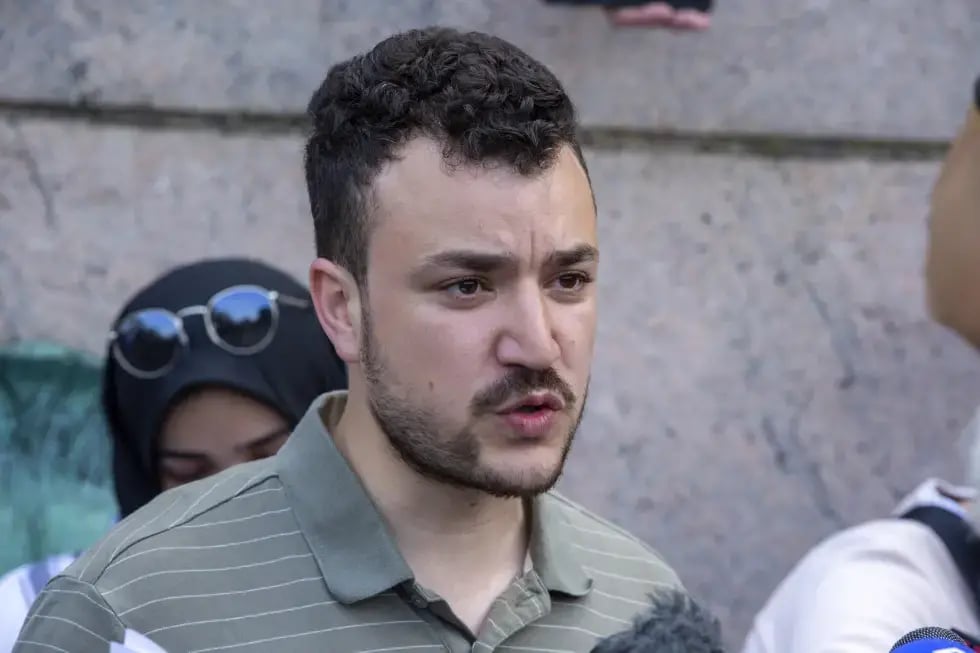The arrest of Mahmoud Khalil, a Palestinian student from Columbia University who served as a student representative in the pro-Palestinian campus protests, has sparked a significant uproar within the Jewish community in both the United States and Israel. Khalil, a green card holder—granting him permanent residency and constitutional protections—was detained by Immigration and Customs Enforcement (ICE) agents in his university apartment due to his involvement in leading demonstrations in support of Hamas.
The majority of the American Jewish community condemns the protests at Columbia and other elite universities, which have led many Jewish students to reconsider whether they feel safe in American academic spaces. Khalil's arrest highlights the challenges facing the Jewish community amid the rise of antisemitism from both ends of the political spectrum and underscores the importance of Israel refraining from intervening in the issue, leaving it for American Jewry to address.
The Anti-Defamation League, the American Jewish Committee, and Orthodox rabbinical figures, for example, welcomed the decision. However, in progressive circles, particularly among younger demographics, dissenting voices have emerged. Marianne Hirsch, a Jewish professor of English literature at Columbia University, defended Khalil, arguing that the U.S. government’s response reminded her of the notorious Securitate police in her native Romania. She asserted that the protests against Israel’s "brutal retaliatory war" are legitimate and that accusations of antisemitism on campus serve merely as a pretext to suppress them.
<< Get the Ynetnews app on your smartphone: Google Play: https://bit.ly/4eJ37pE | Apple App Store: https://bit.ly/3ZL7iNv >>
Even Rabbi Ammiel Hirsch, a prominent voice in liberal Zionism who recently called for abandoning the two-state solution, emphasized the need to protect Jewish students from Hamas supporters on campus. At the same time, he warned of a slippery slope regarding freedom of speech, which he described as "the lifeblood of the American Jewish community." Furthermore, since Khalil's primary defense relies on First Amendment free speech protections, even right-wing figures have rallied to his support, exposing a troubling trend of "arena convergence" and rising antisemitism within the American right.
For instance, popular podcaster Joe Rogan — who interviewed Trump during the elections and previously accused Israel of genocide — hosted Ian Carroll on his show last week. Carroll, an avowed antisemite from the American right, claimed Israel was responsible for the 9/11 attacks and that Zionist crime syndicates control the U.S. government. Simultaneously, Candace Owens, who was named "Antisemite of the Year 2024," defended Khalil, arguing that there is no evidence of his support for Hamas. Khalil's case even prompted Secretary of State Marco Rubio to declare that "the Khalil case is not about free speech." These tensions are also influencing the American political arena, particularly within the Democratic Party.
A group of 14 Democratic members of Congress published a letter calling for Khalil’s release. Former Senate Majority Leader Chuck Schumer — who is also remembered for his attempted intervention in Israeli politics when he called for Netanyahu's removal last year — stated that, while he strongly opposes antisemitism at Columbia, he agrees with some of Khalil's policy positions. Pro-Israel leaders within the party, such as New York Congressman Ritchie Torres and Pennsylvania Senator John Fetterman — who recently expressed staunch support for Israel following the harrowing hostage rescue operation — have so far refrained from commenting on the matter.
Mahmoud Khalil's arrest may prove to be more than an isolated incident. It reflects the complexity and challenges facing the American Jewish community in its relationship with Israel, amid the rise of antisemitism from both sides of the political spectrum in the U.S. and internal struggles within the Democratic Party. The party is now searching for its path after its electoral defeat, which exposed the declining relevance of the progressive agenda adopted in Biden’s later years — an agenda that, among other things, restricted the IDF’s operational capabilities. In the ongoing battle over the party’s future and leadership, it is crucial for pro-Israel voices to prevail so that the mainstream liberal American Jewish community — which rejects extreme progressivism — can once again feel at home within the party.
 Dr. David Barak-Gorodetsky Photo: Haifa University
Dr. David Barak-Gorodetsky Photo: Haifa UniversityThe State of Israel and its official representatives would do well to refrain from intervening in this matter for now, leaving it to the American Jewish community and the U.S. political system to decide. This will help avoid providing ammunition for antisemitism from both the right and the left.
- Dr. David Barak-Gorodetsky is the head of the Ruderman Program for American Jewish Studies at the University of Haifa, which will discuss these issues at its annual conference this week




